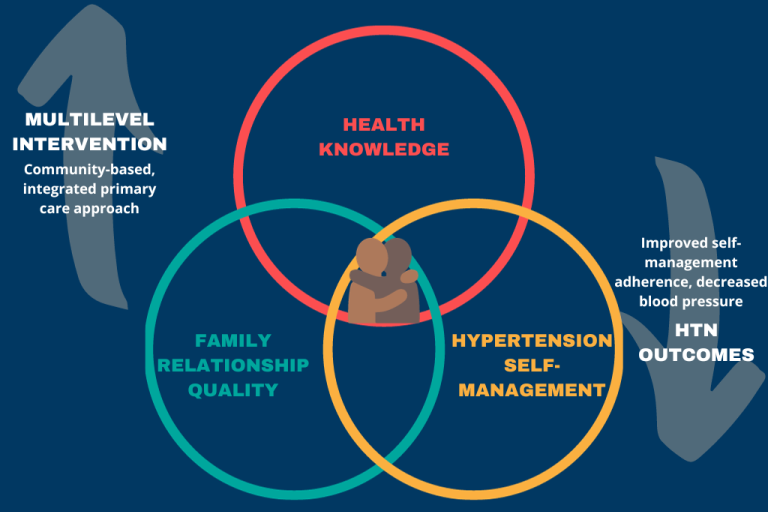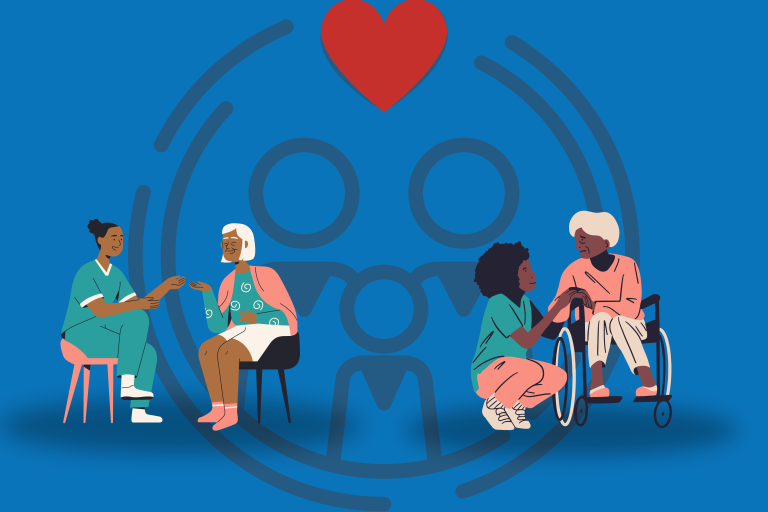Walk Together Intervention
Family Support for African Americans' Hypertension Self-Management
Most of the racial disparities in mortality experienced by African Americans are tied to hypertension, a chronic health condition that currently impacts more than half of African American adults. Despite the empirically-supported benefits of hypertension self-management, too few African Americans achieve hypertension control. Barriers to hypertension self-management for African Americans include stress and difficulty and incorporating and sustaining necessary lifestyle changes. Family support, however, is regularly identified by African Americans as a self-management facilitator -- one that is not leveraged by current hypertension self-management interventions. Family members can encourage and simultaneously adopt positive health behaviors, and be relied upon to share helpful health information. At the same time, family members may undermine patients' behavior change, and family stress may interfere with self-management implementation. Family members must be incorporated into hypertension self-management interventions in order to effect long-lasting behavioral change -- an approach proven effective for other chronic conditions, including for African Americans.
The purpose of this study is to develop a novel family-based hypertension self-management intervention, Walk Together, adapted from an existing empirically-supported dyadic intervention, for implementation in primary care. Specifically, the research aims of this R21 investigation are: (1) To develop an innovative intervention for hypertension that integrates theoretically-driven research on family support effects on health outcomes, and community-based participatory cultural perspectives in the specifics of the intervention; and, (2) to determine the feasibility, acceptability, and safety of the Walk Together intervention.
This study is the first-known study of a family-based intervention to improve hypertension self-management among African American adults in primary care. Our multilevel Walk Together program is based on systemic, biopsychosocial evidence of the impact of families on health, and will target (a) individual patient health behavior and (b) interpersonal family functioning via (c) integration into primary care. We incorporate culturally-specific perspectives of African American patient-family member dyads and will use iterative development and a community-based participatory approach to design and refine the protocol over the course of the project.

Publications

Contact the Walk Together Study Team
- Silvia Obregón, Study Coordinator
- UT Southwestern
- 5959 Harry Hines Blvd
- (806) 560-0817
Family Relationships and Pain Outcomes Among Aging African Americans
Using Secondary Analyses to Test Novel Pathways
Chronic pain is a persistent source of disability and reduced quality of life for aging adults -- outcomes that are disproportionately worse for African Americans, who also report greater pain severity and worse pain-related disability compared to White peers. Though chronic stress is a potent risk factor for pain, an effect made far worse for African Americans due to structural inequities that drive pain disparities, family stress (also exacerbated by these same inequities) is infrequently examined as part of the stress-pain pathway. Conversely, family support lessens stress reactivity, and is identified as critical to pain management by aging African Americans -- however, it too is largely ignored in pain research.
Pain management interventions have failed to keep pace with the complexity that pain treatment requires, and aging African Americans are especially likely to receive inadequate pain care. Understanding biopsychosocial mechanisms contributing to pain outcomes for aging African Americans is key to developing effective interventions, yet existing knowledge about pain mechanisms is compromised by pain research relying on younger, healthier, predominantly White samples or race-comparative approaches. The purpose of this study is to (1) identify the specific role of family stress and support (in both marital and non-marital family relationships) that operate as risk or resilience factors for pain outcomes, and (2) determine how family climate influences pain pathogenesis via biobehavioral reactivity pathways (i.e., depression, anxiety, inflammation), a pathway we predict is potentiated by structural inequities such as discrimination, socioeconomic disparities, and neighborhood disadvantage. We strategically leverage two pre-existing longitudinal, epidemiological datasets to answer these questions: Midlife in the United States, and the Health and Retirement Study.
Findings of this study can inform precision health and the identification of unique chronic pain signatures that take into account not only bio- but psychosocial factors, but also the impact of racism-related stress on pain pathways for a population particularly at risk of inadequate pain treatment.

Publications

Contact the Families & Pain Study Team
- Dr. Quiera Booker, Study Coordinator
- UT Southwestern
- 5959 Harry Hines Blvd
- (214) 648-6225